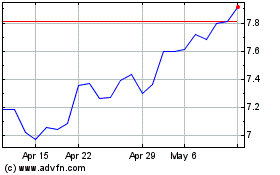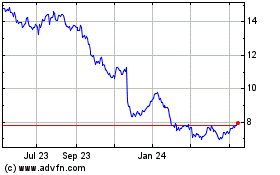By Christopher Alessi and Jacob Bunge
Executives presented Bayer AG's deal to buy Monsanto Co. as a
win for both companies, but shareholders in the two camps weren't
ready to declare victory at the $57 billion price tag.
Bayer shareholders appeared cautiously optimistic after worrying
that the German drugs and chemicals giant could overpay, while some
Monsanto shareholders said they had envisioned a higher price for
the world's largest developer of high-tech crop seeds, though they
acknowledged a deep trough facing the agriculture sector.
"No one's exactly thrilled, which probably means it ended up in
a good compromise situation," said Andy Murray, portfolio manager
at Becker Capital Management, a Portland, Ore. firm that owns
Monsanto shares.
Bayer, which had been pursuing Monsanto for four months,
Wednesday struck a deal to acquire the U.S. firm at $128 a share in
cash. If successful, it will rank as Bayer's largest-ever
acquisition, joining its broad range of pesticide products with
Monsanto's industry-leading capabilities in seeds and biotechnology
to create the world's largest supplier of farm inputs.
The price was welcomed by initially skeptical Bayer investors,
some of whom had predicted Bayer would need to raise its bid to
between $130 and $135 a share to satisfy Monsanto's board. After
unveiling the initial bid for Monsanto in May, Bayer officials
including Chief Executive Werner Baumann hit the road for several
weeks to meet with shareholders and explain what many investors
regarded as an abrupt shift in strategy, potentially at a steep
cost.
"I was surprised that the price was cheaper than I thought,"
said Markus Manns, fund manager at Bayer shareholder Union
Investment. Monsanto's bargaining position may have been weakened
due to the continued slump in the farm economy, he said. Futures
prices for corn -- Monsanto's biggest product line -- hit a
seven-year low in late August as a record U.S. harvest looms.
Some Monsanto shareholders, however, said that shorter-term
challenges shouldn't diminish the value of the world's largest
biotech seed developer, where advances in technology can take
longer than a decade to bring to market, spanning any number of ups
and downs in commodity markets. A survey by Sanford C. Bernstein
analysts conducted prior to the deal's announcement showed that the
largest number of respondents anticipated a price between $129 and
$130 a share.
"The strategic sense of [the deal] is right," said Kelly
Wiesbrock, managing director at Harvest Capital Strategies LLC, a
San Francisco-based investment firm that owns Monsanto shares. "The
price is a little disappointing."
Mr. Baumann told analysts on a conference call Wednesday that
the deal would allow Bayer to deliver value to its shareholders
from an upswing in agricultural markets and longer-term growth in
the global population. Hugh Grant, Monsanto's CEO and chairman,
said Bayer represented a good strategic fit, and Monsanto's board
approved the deal after exploring alternative paths, including
staying independent.
Bayer's shares fell 2.3% to settle at EUR91.37 Thursday, while
Monsanto's stock fell 2.4% to $104.22. Investors said the prices
reflected some disappointment on the deal price as well as
uncertainty due to the lengthy regulatory gauntlet facing the deal,
with approval required by dozens of regulators around the world.
The companies expect the transaction to close by the end of next
year.
The lower-than-expected price, combined with the current lending
environment, should allow Bayer to relatively quickly reduce its
debt, having already swelled from a string of acquisitions,
investors said. Bayer's net debt stood at EUR17.45 billion (about
$20 billion) in 2015, more than double the EUR7 billion it held in
2011.
Jim Nelson, a portfolio manager and Bayer investor Euro Pacific
Capital Inc. in New York, said the deal should benefit Bayer since
it is funded primarily with money borrowed at very low rates. "The
combined company would control 30% of the overall seeds market,
resulting in increased pricing power," he added.
Purchasing Monsanto may leave Bayer little flexibility to pursue
other acquisitions. To generate cash, it may need to divest its
majority stake in Covestro AG, a specialty-plastics business that
Bayer spun off last year, and its animal-health unit, some analysts
said.
Securing the deal would make agriculture roughly half of overall
group sales, compared with 30% in 2015. The health-care business
would then comprise roughly the other half of sales.
Some Bayer investors remain uncomfortable with the shift. Greg
Herbert, a fund manager at U.K.-based Jupiter Fund Management PLC,
said last week that after buying Monsanto, Bayer would "be left
with a highly geared balance sheet and the management effort to
integrate the two businesses could easily lead to the larger
pharmaceutical business being neglected." Mr. Herbert said Thursday
he had no further comment on the deal.
David Moss, head of European Equities for F&C Management
Ltd., which owns Bayer shares, said he sees long-term growth ahead
for agricultural companies as the global population expands and
grows more wealthy. "This will be the biggest play on that and it's
a cheap stock at the moment," he said. "The fear was, they might
pay an awful lot more."
Write to Christopher Alessi at christopher.alessi@wsj.com and
Jacob Bunge at jacob.bunge@wsj.com
(END) Dow Jones Newswires
September 15, 2016 19:09 ET (23:09 GMT)
Copyright (c) 2016 Dow Jones & Company, Inc.
Bayer Aktiengesellschaft (PK) (USOTC:BAYRY)
Historical Stock Chart
From Mar 2024 to Apr 2024

Bayer Aktiengesellschaft (PK) (USOTC:BAYRY)
Historical Stock Chart
From Apr 2023 to Apr 2024
